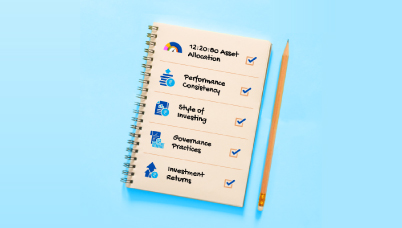Plan Your Retirement with Mutual Funds
Posted On Wednesday, Sep 27, 2017
Planning is essential for anyone whether it is a holiday, a birthday celebration or any other event. We live in a modern world where various amenities help us to plan and execute. Till the time you have regular source of income you need not worry much about the financial assets of those plans. However, after retirement, regular source of income could potentially vanish but expenses will remain.
It is advisable that an investor starts his/her retirement planning on the first day of the job. It will add value to your planning. You can raise your investments in line with rise in income which will be beneficial for life even after retirement. You may come across various investment vehicles which may help you in financial planning, retirement planning etc. However, investment in mutual funds is one of the most diversified investment option that gives you the liberty to select investment options best suited for your financial goals. Plan your retirement with mutual funds at an early age and then enjoy the benefits of long term investments after retirement.
Which is the preferred asset class when it comes to retirement planning?
Equity, Debt or Both…Which fund is the best for you?
The answer depends on your income, age, risk taking capacity and your financial goal. Apart from equity and debt ,you have balanced fund where you can avail benefits of asset classes , equity and debt.
Volatility and risk is comparatively higher in equity markets compared to debt funds. In short, prices of stocks and shares are trading with high volatility compared to prices of government bonds where a debt fund manager parks investor’s money.
Generally young people are willing to take high risks and prefer investing in equity funds, however, investment in debt funds is suitable for the elderly as risk of losing the principal amount is comparatively less.
Moreover, gold is looked upon as a diversification tool. One must also have 10 – 15% allocation in gold in their portfolio.
How to invest?
Systematic Investment Plan (SIP) could be your key to a happy retirement life. One of the preferred ways of investing in a mutual fund is through a SIP. In SIP, you can invest every month with a minimum amount of Rs.500. While SIP makes you a disciplined investor, it also gives your money professional fund management skills which helps you achieve your goal of retirement planning.
Following are 3 advantages of investing in mutual funds especially for retirement planning:
• SIP - Systematic Investment Plan (SIP) allows you to invest a minimum amount on a monthly basis which helps to save money for retirement life without disturbing today’s expenditure.
• Ability to Switch - As a young investor, you might be able to take higher risks for higher returns, hence investment in equity is the best investment model. However, as you near your retirement age, it is advisable to gradually shift your investments into lower risky assets like debt funds. A mutual fund offers you the facility to switch between funds of the same fund house. A Systematic Transfer Plan (STP) allows you to systematically move specific amounts from one scheme to another, in this case from equity to debt.
• Regular income - Mutual funds allows you to automatically withdraw specific amounts (or units) on a monthly/quarterly/half yearly/yearly basis. It provides you a regular source of income even after retirement.
To conclude, a key difference in life before and after retirement is source of income which is not available after retirement. Investment in mutual funds will help you avail a regular source of income with benefits of diversification of risk. You can gain tax benefits on investments. You could choose the most suitable fund for a better retirement life.
Consult your financial advisor before taking any investment decision.
Disclaimer, Statutory Details & Risk Factors:
The views expressed here in this article are for general information and reading purpose only and do not constitute any guidelines and recommendations on any course of action to be followed by the reader. Quantum AMC / Quantum Mutual Fund is not guaranteeing / offering / communicating any indicative yield on investments made in the scheme(s). The views are not meant to serve as a professional guide / investment advice / intended to be an offer or solicitation for the purchase or sale of any financial product or instrument or mutual fund units for the reader. The article has been prepared on the basis of publicly available information, internally developed data and other sources believed to be reliable. Whilst no action has been solicited based upon the information provided herein, due care has been taken to ensure that the facts are accurate and views given are fair and reasonable as on date. Readers of this article should rely on information/data arising out of their own investigations and advised to seek independent professional advice and arrive at an informed decision before making any investments.
Mutual fund investments are subject to market risks read all scheme related documents carefully.
Please visit – www.QuantumMF.com to read scheme specific risk factors. Investors in the Scheme(s) are not being offered a guaranteed or assured rate of return and there can be no assurance that the schemes objective will be achieved and the NAV of the scheme(s) may go up and down depending upon the factors and forces affecting securities market. Investment in mutual fund units involves investment risk such as trading volumes, settlement risk, liquidity risk, default risk including possible loss of capital. Past performance of the sponsor / AMC / Mutual Fund does not indicate the future performance of the Scheme(s). Statutory Details: Quantum Mutual Fund (the Fund) has been constituted as a Trust under the Indian Trusts Act, 1882. Sponsor: Quantum Advisors Private Limited. (liability of Sponsor limited to Rs. 1,00,000/-) Trustee: Quantum Trustee Company Private Limited. Investment Manager: Quantum Asset Management Company Private Limited. The Sponsor, Trustee and Investment Manager are incorporated under the Companies Act, 1956.
Related Posts
-

Do You Need to Update Your KYC/Modify KYC?
Posted On Friday, Apr 26, 2024
New KYC Regulation Effective April 1st 2024
Read More -

Are You Stuck in the Past or Ready for a Secure Future?
Posted On Wednesday, Jun 29, 2022
The ever-growing number of mutual fund schemes on offer has made it challenging for investors to select the best and most suitable one.
Read More -

Received an Increment? Step-up Your SIPs
Posted On Wednesday, Jun 01, 2022
For instance, let’s assume that you have registered for a monthly SIP of Rs 5,000 for a 10-year period and later on try to step-up the SIP at an annual frequency, say by Rs 500. In the first year...
Read More



